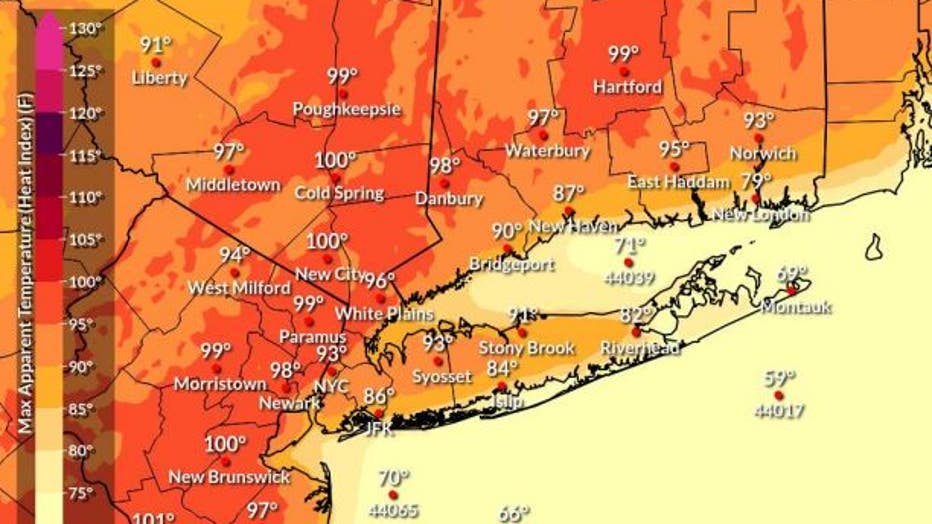Heat advisory issued for NYC, temps expected to hit near-record highs
Near-records set as heat sweeps region
A heat advisory is in effect for much of the Tri-State area, as nearly record-breaking temperatures swept the region on Saturday.
NEW YORK - Temperatures soared into the '90s this weekend in what might be a preview of a long, hot summer to come.
New York City, the Hudson Valley, northeastern New Jersey, and most of Connecticut are under a heat advisory from noon to 8 p.m. as temperatures rose into the low 90s on Saturday, with humidity bringing heat indices to nearly 100 degrees.
Another advisory will be issued Sunday as head indices are expected to remain in the mid to high 90s.
Seniors and those with chronic health problems or mental health conditions are at increased risk, and officials are reminding people to use air conditioners to stay cool, take frequent rest breaks if working outdoors, and check on vulnerable friends, family members, and neighbors.
Moreover, anyone headed to the beach to cool off should keep in mind that ocean and nearshore water temperatures are still in the 50s and 60s, which can cause physical incapacitation and hypothermia in as little as 10 minutes if you fall into the water.

Credit: Weather.gov
TIPS TO BEAT THE HEAT
- Use an air conditioner during hot weather and heat emergencies, even if it is only for a few hours. A setting of 78 degrees F (or low cool) can provide a comfortable environment, help save on electricity bills, and conserve energy.
- If you do not have an air conditioner, you may qualify for energy assistance. Visit the Human Resource Administration online for information about the Home Energy Assistance Program (HEAP).
- During heat emergencies, the City will open cooling centers throughout the five boroughs. To find a cooling center near you, visit the NYC.gov cooling center map or visit the Cooling Center Finder or contact 311 (212-639-9675 for Video Relay Service, or TTY: 212-504-4115) to find out whether a cooling center is open near you.
Note: Cooling centers are facilities managed by agency partners who determine each site's hours of operation and level(s) of accessibility. For additional information, please contact these facilities directly.
Extreme heat is one of the most significant hazards facing New York City, and New Yorkers are especially vulnerable to extreme heat-related hazards during the summer months.
The following people are most at risk:
- Elderly persons and small children are mostly affected
- Persons who are overweight/obese
- Persons on certain medications or drugs
Be Prepared:
- Avoid strenuous activity and exercise, especially during the sun's peak hours of 11 a.m. to 4 p.m.
- Exercise and activity should be done in the early morning between 4 a.m. and 7 a.m.
- Drink plenty of water and noncaffeinated beverages.
- Stay out of the sun and try to cool off in an air conditioned building for a few hours during the hottest part of the day. The sun heats the inner core of your body, resulting in dehydration. If air conditioning is not available, stay on the lowest floor, out of the sunshine, or go to a public building with air conditioning
- If you must go outdoors, wear sunscreen with a high sun protector factor rating (at least SPF 15) and a hat to protect your face and head. When outdoors, wear loose-fitting, lightweight and light-colored clothing. Cover as much skin as possible to avoid sunburn and over-warming effects of sunlight on your body.
- Do not leave children, pets or those who require special care in a parked car or vehicle during periods of intense summer heat. Temperatures inside a closed vehicle can reach over 140 degrees Fahrenheit quickly. Exposure to such high temperatures can kill within a matter of minute.
- Make an effort to check on your neighbors during a heat wave, especially if they are elderly, have young children or have special needs. Make sure there is enough food and water for pets
Know the Signs of Heat Related Illness
Prolonged exposure to the heat can be harmful and potentially fatal. Call 911 if you or someone you know shows signs or symptoms of heat illness, including:
- Headache
- Light headedness
- Muscle cramps
- Nausea
- Vomiting
For more information on how to stay safe during periods of excessive heat, visit health.ny.gov

